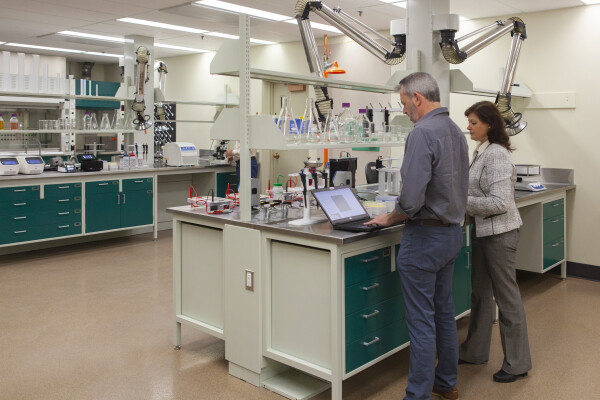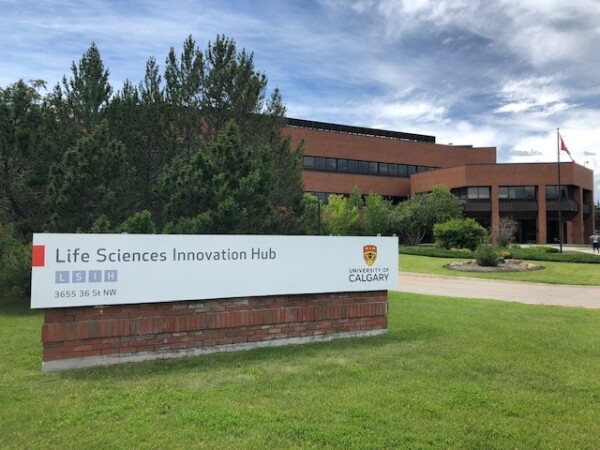Visionaries, scientists and researchers convene in Calgary to discover new solutions at the Life Sciences Innovation Hub (LSIH).
To grow the newly emerging life sciences sector for Calgary, the Opportunity Calgary Investment Fund (OCIF) committed $8.5 million to the hub at the University of Calgary in 2019.
The goal was to create a collaboration space to help students, researchers, startups, and entrepreneurs build promising companies in the life sciences — one of the key sectors identified for growth in the city’s economic strategy.
Now, the LSIH convenes startups from around the world with daring approaches to complex problems, attracting the attention of researchers, industry experts, talent and investors to Calgary’s life sciences sector.
A sector in its infancy
As the study of living things and processes, the life sciences sector represents the discoveries of solutions in health care and technology – such as disease diagnosis – as well as agriculture and food sciences.

Before OCIF support, the life sciences ecosystem in Calgary was still in its early stages of development.
Scientists were conducting innovative research in the city, but it was challenging to bring a commercial venture to market without access to lab space, equipment, seed funding, peer support or business guidance.
“Before we received OCIF funding, we had to build something from almost nothing,” recalls Nima Najand, Senior Director, Innovation Hubs at Innovate Calgary.
Now, the LSIH continues to attract startups from across Canada and beyond, with each participating venture receiving support to navigate intellectual property, commercialization and regulation challenges.
To date, the LSIH has supported nearly 400 local and international companies, which have in turn generated over $270 million in revenue and raised $87 million in capital. Calgarians now have access to meaningful career opportunities in the sector, as the LSIH has also helped create over 550 jobs in these companies, effectively kickstarting a growing life sciences ecosystem in Calgary.
“OCIF funding was instrumental in helping us launch the hub,” Najand says. “We wouldn’t have been able to create the hub without it.”
A hub for ground-breaking work
For early-stage companies, finding space to work and opportunities for collaboration are two significant challenges.
The LSIH helps bridge these solutions for startups. The hub provides lab spaces to facilitate experiments and trials, and gives both local and non-local companies opportunities to network with each other, attend business-focused events, connect one-on-one with expert advisors and learn how to pitch for external investment.
Housed in a 112,000-sq.ft space, the LSIH has maintained a consistent company occupancy rate over 90 per cent over the past five years.
OzoneBio, a green tech company working to create emissions-free nylon using so-called “zombie cells,” came to Calgary from the Maritimes specifically to work in the LSIH. Others have come to Calgary from Montreal, Singapore, Iran and the U.S.
“We're finding that more and more investors are showing up to our events, because they want to scope out the next great technology,” Najand says. “For the early-stage companies, it gives them facetime with investors that they would otherwise maybe not have had.”
The hub’s early graduates are already bolstering a local ecosystem, Najand says.
Exergy is a Calgary-based engineering design firm that was primarily servicing the oil and gas industry when it came to the LSIH.
“While [Exergy was] here, they pivoted their business to support the life sciences sector to a much larger extent,” Najand explains. “They actually supported the production and prototyping of an emergency ventilator during COVID.”
Exergy’s team was small when they joined the LSIH, but it grew quickly. Eventually, they built their own larger facility in Quarry Park in Calgary.
“We were helping them in those initial stages to get their footing and grow beyond the hub. And that’s exactly the model we want and the role we want to play,” Najand says.
Attracting talent and anchor companies key to future growth
The LSIH will continue driving innovation with its successful model, but for Calgary to continue growing its life sciences sector, attracting and retaining talent and larger ‘anchor’ companies is critical.
Further growth of the ecosystem hinges on training future researchers in our post-secondary institutions, keeping local talent in the city and exploring how workers from other sectors like oil and gas could apply their skills to life sciences companies, Najand says.
Success of the industry also requires larger, more established pharmaceutical or medical device companies to move or expand in Calgary. Now, with the clustering effects around the Life Sciences Innovation Hub, many may now consider Calgary for a new outpost or head office, recognizing the momentum of the sector.
“By building our own ecosystem and by creating that critical mass locally, Calgary is now on the radar for a lot of these companies, and they’re taking us more seriously,” Najand says. “In the next five years, we would expect to see some of these larger companies have a large footprint here in Alberta.”
Building a company in Calgary means benefitting from the city’s “infectious intention to succeed,” says Sabina Bruehlmann, CEO of Nimble Science, the LSIH’s first-ever tenant.
“We are choosing to grow in Calgary because of the momentum and energy we get from the ecosystem.”
As Calgary continues to welcome more life sciences companies to the city, the LSIH plans to welcome one as its neighbour.
“We have land available directly beside the LSIH where an existing company can expand their Canadian footprint and collaborate directly with the LSIH and the startups being incubated there,” Najand says.
Established by the City of Calgary in 2018, OCIF has committed $83.9 million in funding to organizations like the Life Sciences Innovation Hub that multiply opportunities to enhance Calgary’s economic resiliency.
Learn more about the Opportunity Calgary Investment Fund.
About the Life Sciences Innovation Hub: The Life Sciences Innovation Hub at the University of Calgary is designed to help students, researchers, and entrepreneurs build promising life science-based companies. It provides access to the infrastructure, equipment, expertise and startup support services companies need to bring commercially viable products and services to market.



